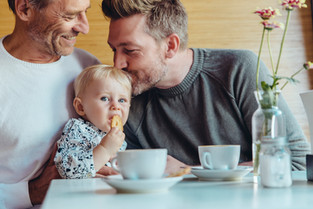Are Tribes 2.0 a solution to a 21st Century Crisis?
- ARC Malta

- Mar 22, 2019
- 3 min read
Updated: Mar 25, 2019
Opinion piece by Clayton Mercieca
A redefined version of Tribes may be an answer to the social problems we face in the 21st Century.
I've been a parent for almost 18 months now and it's not a joke when I tell you - parenting is fucking hard. As it is expected, kids in their infancy tend to get sick a lot, especially when they attend childcare and infections spread like wildfire. When this happens, our kid has at least a week homebound and medicated before his immunity is good to fight off new germs. As a result, me and my husband have to reschedule our lives around to make sure at least one of us is at home taking care of him. For any family with work obligations, this is of inconvenience for us, our employers and the people we committed our time to.
In contrast to the generations before me, where women were the prescribed main caregivers and stay-home mums with possible 2 very much available grandmothers and some extended family to give a hand and relieve the mother - my generation is pretty much left to fend off by itself with very little help from blood relations. Both our parents are still active in the workforce and close family members are pretty much taken up by their own commitments. Who do we turn to when we both have engagements that cannot be shifted around? One might say it's easy to get child minding services but I have my own reservations, after all, this is no date night.
In my experience of encountering diverse forms of families, I've encountered a particular family unit which strikes me as unconventional but can be considered a tribe - 2 fathers, 2 mothers and kids. The kids are being raised, for most of the time, by the dads whilst having the mothers supporting them financially and spending time with their kids on regular occasions. There were no family courts or disputes with visitation rights involved as it was all agreed before the kids came into existence.
It is definitely not a traditional family but it can be considered a modern version of a tribe. One of my conversations with HIV activist Chris Vincent during his time in Malta was this word. He aims to reclaim the word 'tribe' for the LGBTQ+ community as it can shape a new meaning for our cohort. He believes that until we keep spelling out this ever increasing acronym, we're going to enforce a sense of us vs. them within the queer community. On the other hand, a tribe can mean a collective of queer people with a shared value system and looks out for one another, irrelevant of their gender and sexual orientation.
If couples nowadays are reconsidering having kids as a result of the expenses involved or because it takes up too much autonomy and freedom, notwithstanding their inherent desire to have children, a tribe can pretty much solve a lot of problems. I see no issues with the development and wellbeing of the kid/s involved. They are being brought up by multiple & loving parents who have their wellbeing at heart rather than thrown in the middle of endless legal battles between adults fighting over visitation rights. The only problem with this family arrangement is purely a legal one as in most countries, a child can only have a maximum of 2 legal parents.

Tribes 2.0 can also be very important for the older generation. As we are living longer and healthier lives and most elderly are faced with less family relatives to care for them, who do they turn to? The obvious answer is residential homes but we all know that this is, in most cases, a last resort scenario, especially if it doesn't fall on the high-end/luxury living spectrum. For those who prefer living in their own homes, they tend to isolate themselves from others, and when the inevitable and undesirable happens, they are faced with many fears leading to a higher dependency on strangers and a lack of autonomy.
What if then the solution becomes a 'Golden Girls' or 'Grace & Frankie' kind of scenario. Where friends or members of the same community are sharing private housing whilst being of companionship and support to one another? It seems such a simple solution and yet why do I still see a lot of elderly people living alone in deteriorating houses?
The LGBTQ+ community can be a trendsetter in forming tribes that are of virtually zero economic burden to Government services whilst improving the dignity and wellbeing of children, families and the elderly. It just needs to find a more accepting and enabling environment in order to do so.















AV在线看 AV在线看;
自拍流出 自拍流出;
国产视频 国产视频;
日本无码 日本无码;
动漫肉番 动漫肉番;
吃瓜专区 吃瓜专区;
SM调教 SM调教;
ASMR ASMR;
国产探花 国产探花;
强奸乱伦 强奸乱伦;
AV在线看 AV在线看;
自拍流出 自拍流出;
国产视频 国产视频;
日本无码 日本无码;
动漫肉番 动漫肉番;
吃瓜专区 吃瓜专区;
SM调教 SM调教;
ASMR ASMR;
国产探花 国产探花;
强奸乱伦 强奸乱伦;
代发外链 提权重点击找我;
游戏推广 游戏推广;
Fortune Tiger Fortune Tiger;
Fortune Tiger Slots Fortune…
谷歌马甲包/ 谷歌马甲包;
谷歌霸屏 谷歌霸屏;
מכונות ETPU מכונות ETPU;
;ماكينات اي تي بي…
آلات إي بي بي…
ETPU maşınları ETPU maşınları;
ETPUマシン ETPUマシン;
ETPU 기계 ETPU 기계;
代发外链 提权重点击找我;
google留痕 google留痕;
Fortune Tiger Fortune Tiger;
Fortune Tiger Fortune Tiger;
Fortune Tiger Slots Fortune…
站群/ 站群;
万事达U卡办理 万事达U卡办理;
VISA银联U卡办理 VISA银联U卡办理;
U卡办理 U卡办理;
万事达U卡办理 万事达U卡办理;
VISA银联U卡办理 VISA银联U卡办理;
U卡办理 U卡办理;
온라인 슬롯 온라인 슬롯;
온라인카지노 온라인카지노;
바카라사이트 바카라사이트;
EPS Machine EPS Machine;
EPS Machine EPS Machine;
EPS Machine EPS Machine;
EPS Machine EPS Machine;
google 优化 seo技术+jingcheng-seo.com+秒收录;
Fortune Tiger Fortune Tiger;
Fortune Tiger Fortune Tiger;
Fortune Tiger Fortune Tiger;
Fortune Tiger Slots Fortune…
站群/ 站群
gamesimes gamesimes;
03topgame 03topgame
EPS Machine EPS Cutting…
EPS Machine EPS and…
EPP Machine EPP Shape…
Fortune Tiger Fortune Tiger;
EPS Machine EPS and…
betwin betwin;
777 777;
slots slots;
Fortune Tiger Fortune Tiger;